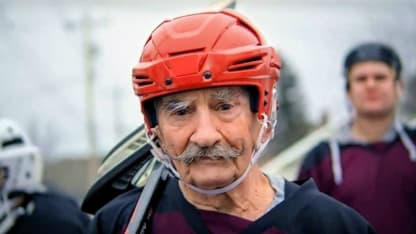The more fellow hockey players played alongside him, the more they got to know him, including his refusal to use even an aspirin as he recovered from injuries or illnesses, no matter how severe. When he got that leg injury last year, they weren't sure he'd ever walk again given the muscle had detached from the bone, but back he came in no time at all, ready to get on that ice again.
"He got himself through so many injuries where everybody else said, 'That's it, no more hockey,' and a month later he was back out on the rink," Cynthia Flood, one of Sertich's seven children, told the Minneapolis Star-Tribune.
And even as he lived independently, still driving and riding his stationary bike, his hockey community became his friend circle and support system over countless postgame cups of coffee.
Youngblom and the other firefighters helped around the house when he needed it, took him to get hearing aids that he refused to wear, and organized getting Guinness World Records to certify his status as the world's oldest hockey player. Once he did it the first time, he was determined to break his own record every year.
When he was up for it, Sertich told them stories about his time serving in the U.S. Army in World War II and helping to liberate the Mauthausen Concentration Camp in Austria.
"He took Polaroid pictures of the camps and it was hard to get him to do it but every once in a while he would tell us about it and take them out," Youngblom said. "And even this many years later, 75 years later, it would still choke him up when he would talk about it. It was very emotional for him but he was also very proud that he had a part in it."
When the coronavirus pandemic meant he couldn't have a typical birthday party to celebrate his 99th, Youngblom called on his fire department, paramedic and police connections to surprise Sertich with a siren-filled drive-by bash.
"We weren't doing him a favor by hanging out with him," Youngblom said. "He was doing us a favor and he was just a really good friend even though most of us were young enough to be his kids."
Given all he'd been through in his life, even receiving a cancer diagnosis just a few weeks ago wasn't enough to dampen his optimism. He suffered a stroke shortly after that and spoke with friends and family that came to be by his side in his final days.
"For me, that's an example of how one should live his or her life," Stauber said. "Country, community, passion for the hockey, passion for his family and his wife and, boy, if we could take Mark Sertich's life and even do half as good, this world would be so much better."



